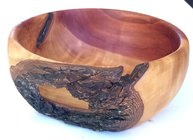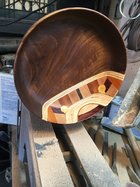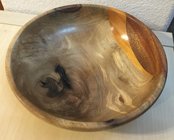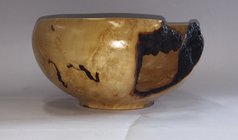PREFACE: This thread is for the folks who sell their work (or are thinking about it). Most turners are hobbyists who do it for fun, creativity, personal achievement and many other very valid reasons. But how many of us actually sell and want to make a profit? (or at least have the hobby pay for itself?) By starting this topic, I don't want to offend anyone or be inappropriate in any way. I know money can be a weird topic. That said, I've been looking for this kind of discussion for years in various forums and also by talking to many other turners, but it seems to be very difficult to talk about. And it always ends up very vague. Can we talk specifics?
I realize almost no one makes their living as a woodturner. I've been lucky enough to sell a few hundred pieces over the years. I've sold mostly to individuals and I'd like to start doing some art shows. But I'd like to know what might be realistic based on the experiences of others in addition to myself.
I've sold bowls ranging in price from $25 to $1,000. I did a small show a couple years ago on a Saturday and after subtracting the entry fee, I sold 10 bowls and came home with about $1500. For me, that was worthwhile. Currently I sell 30-40 bowls a year (just through word of mouth and returning customers) and it's enough to pay for the hobby with maybe a little left over. I gross around $10k/year and a lot of that goes back into tools/sandpaper/shop upkeep, etc.
I might be crazy optimistic here, but at a larger art/craft show, in a large city, (I live in Los Angeles) would it be possible (or plausible) to take home $4,000 for a weekend? I would venture to guess I might be able to sell 20 bowls over a weekend art show at an average price of $200. Basic math suggests if someone participated in 4 shows per year that would be an extra $16k in gross sales for a year's worth of turning. Am I insane? All of a sudden the hobby becomes somewhat more profitable.
Would anyone else mind sharing the range of your selling prices?
Approximately how many pieces do you sell per year?
Do you base your pricing on an "hourly rate" basis, or is it based on something else?
How much money would you have to make to make a weekend art/craft show worth it to you?
How many art/craft shows would you be willing/able to do in a year?
Or is selling online really the best way to go?
I look forward to an open discussion and feel free to take it any direction. I truly think woodturning is an underrepresented art form and I'd love for the stature and respect of this art form to grow and become more appreciated. Ive seen some incredible work on this website!
I realize almost no one makes their living as a woodturner. I've been lucky enough to sell a few hundred pieces over the years. I've sold mostly to individuals and I'd like to start doing some art shows. But I'd like to know what might be realistic based on the experiences of others in addition to myself.
I've sold bowls ranging in price from $25 to $1,000. I did a small show a couple years ago on a Saturday and after subtracting the entry fee, I sold 10 bowls and came home with about $1500. For me, that was worthwhile. Currently I sell 30-40 bowls a year (just through word of mouth and returning customers) and it's enough to pay for the hobby with maybe a little left over. I gross around $10k/year and a lot of that goes back into tools/sandpaper/shop upkeep, etc.
I might be crazy optimistic here, but at a larger art/craft show, in a large city, (I live in Los Angeles) would it be possible (or plausible) to take home $4,000 for a weekend? I would venture to guess I might be able to sell 20 bowls over a weekend art show at an average price of $200. Basic math suggests if someone participated in 4 shows per year that would be an extra $16k in gross sales for a year's worth of turning. Am I insane? All of a sudden the hobby becomes somewhat more profitable.
Would anyone else mind sharing the range of your selling prices?
Approximately how many pieces do you sell per year?
Do you base your pricing on an "hourly rate" basis, or is it based on something else?
How much money would you have to make to make a weekend art/craft show worth it to you?
How many art/craft shows would you be willing/able to do in a year?
Or is selling online really the best way to go?
I look forward to an open discussion and feel free to take it any direction. I truly think woodturning is an underrepresented art form and I'd love for the stature and respect of this art form to grow and become more appreciated. Ive seen some incredible work on this website!




